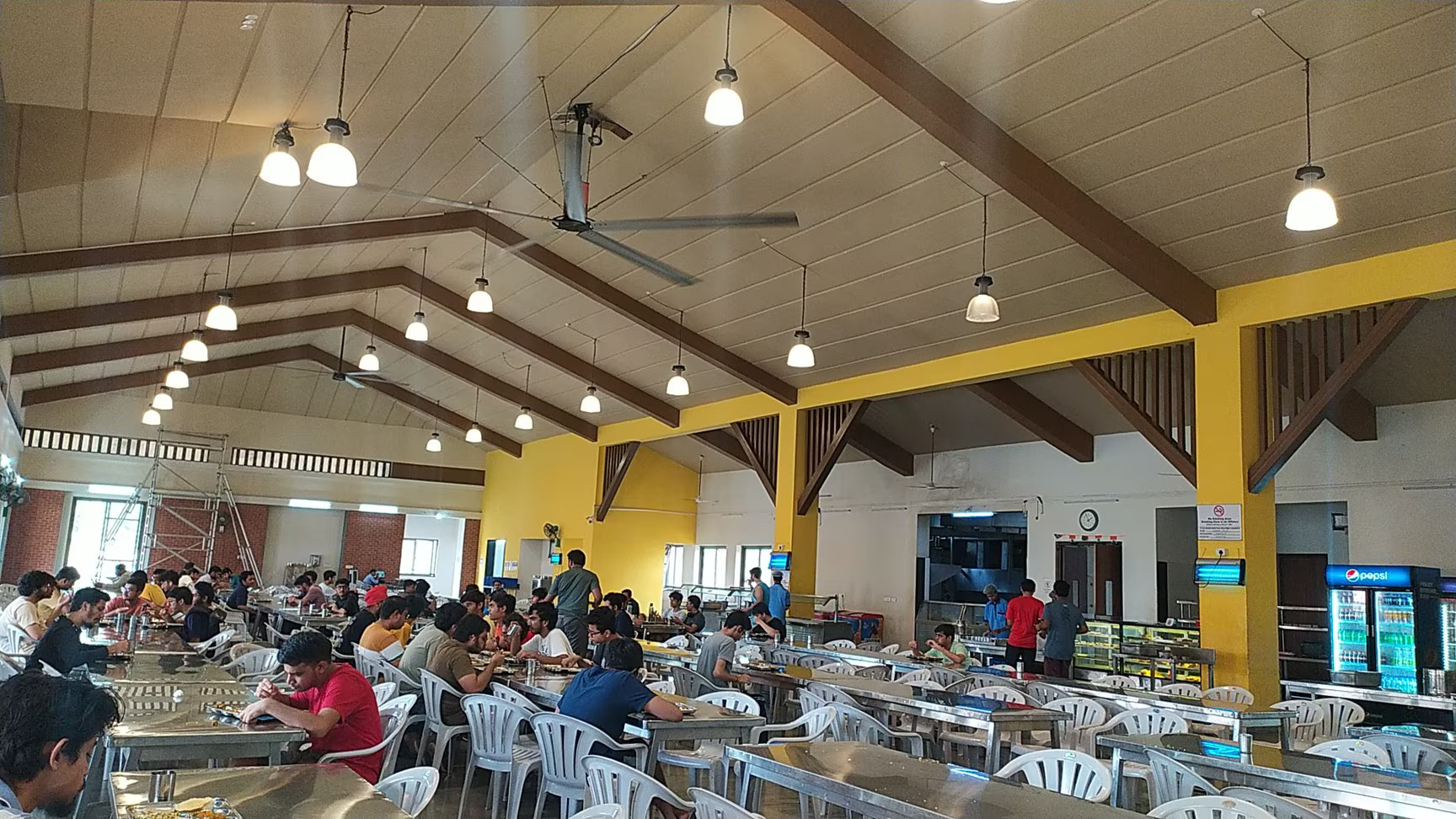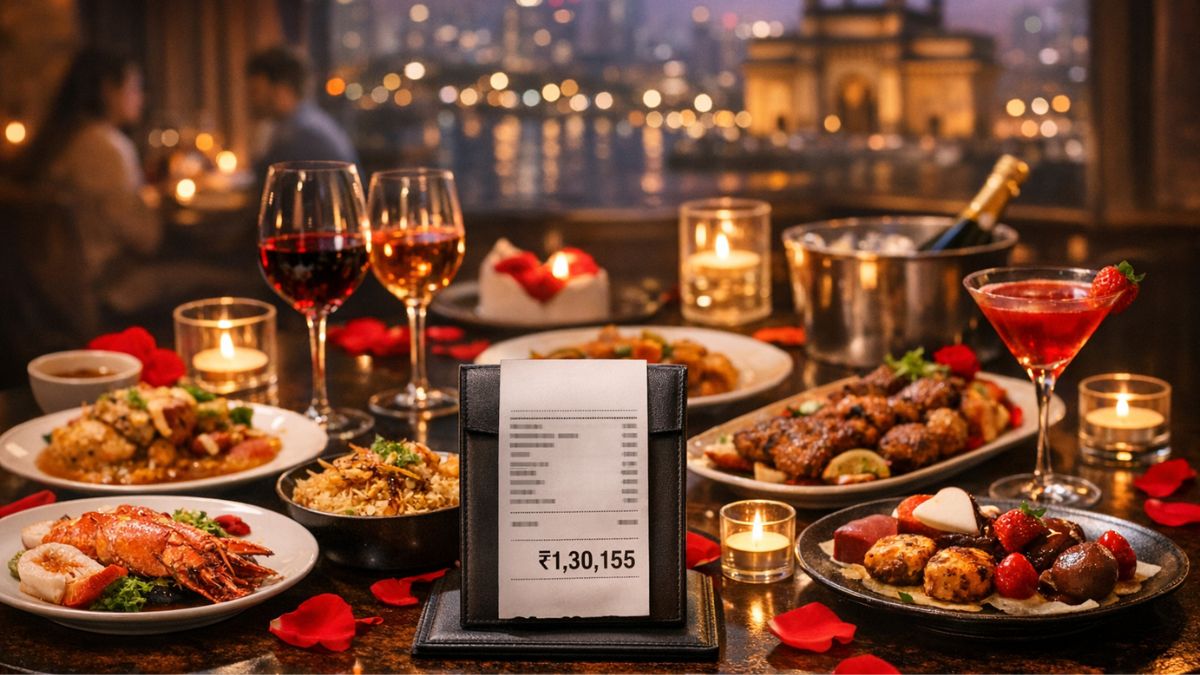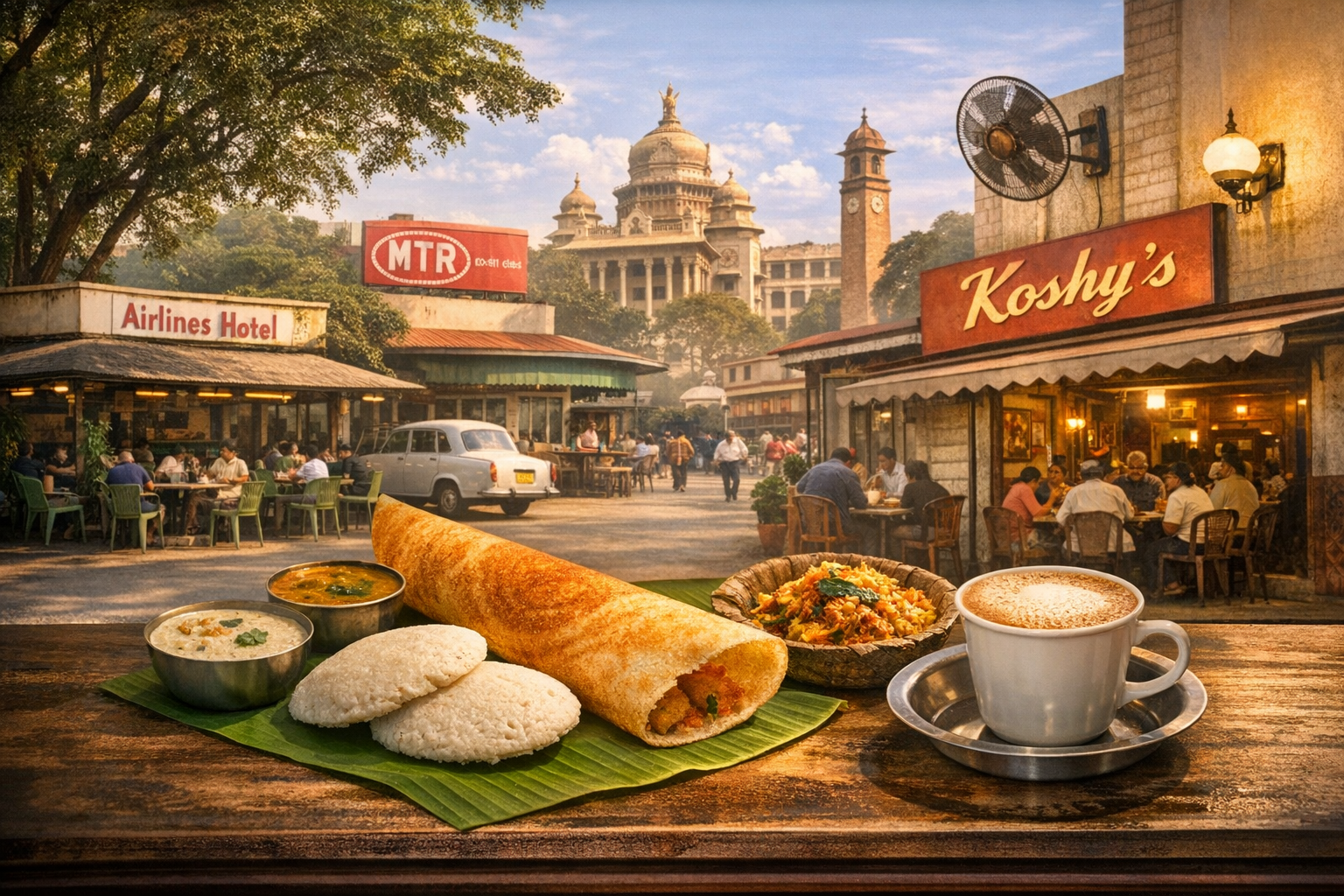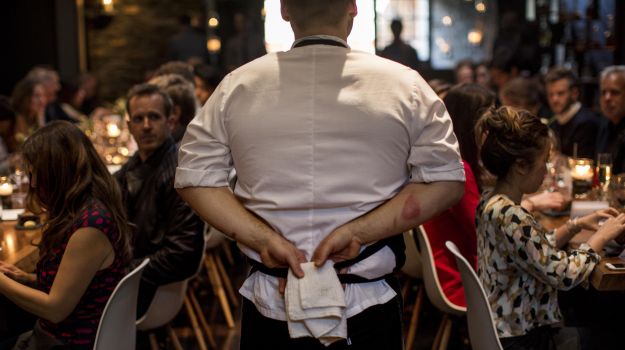Image Credit: The Washington Post"Do you have a reservation?" used to be the standard brush-off line at a busy restaurant's host stand. Now, in a growing number of places, it's "Do you have a ticket?"
Yep, just like a movie or a concert. Ticketed dining has arrived - along with apps that charge fees for in-demand reservations, apply automatic payment or Uber-style surge pricing and allow eBay-style bidding on hot reservations. At some restaurants, making a reservation is no longer a matter of clicking a time on OpenTable or picking up the phone.
In Washington, the newly reopened Columbia Room is ticketed. The Shaw Bijou, the forthcoming restaurant from "Top Chef" competitor Kwame Onwuachi, will be ticketed. So, too, will Pineapple and Pearls, the soon-to-open sister restaurant to Rose's Luxury, which has never stuck to convention when it comes to reservations. (It doesn't take them.)
"We wanted to create an experience where the guests would not have a bill at the end of their meal," Pineapple and Pearls chef-owner Aaron Silverman said via email.
Columbia Room owner Derek Brown said he was similarly motivated. "You tap your date on the shoulder and you're like, 'Let's go,' " he said. "There's none of that jostling that you have to do at the end."
But it's clearly not all about the consumer. Across the country, such new systems are also returning some control to restaurants, raising questions about power, fairness and risk - and what exactly we're paying for, other than the food, when we go out to eat.Restaurant reservations date to the late 19th century, when guests could arrange a room for catered banquets if they wanted to entertain and had the money - but not the butler, maids and cooks - to support it. The practice of reserving just a table emerged to accommodate affluent bachelors looking for ways to court single ladies without the impropriety of hosting them at home. Restaurants also reserved tables to entice regulars, usually businessmen. As the consumer culture of the post-war 1950s flourished, so did taking reservations by telephone. The next big innovation, those buzzing pagers that hosts hand out to waiting guests, were introduced in the early '90s. With the dot-com boom came the Open Table reservation service, which was founded in 1998 and has been the industry leader ever since.
 Image Credit: Kate Patterson
Image Credit: Kate Patterson
But as it became easier to make reservations with just one click, it also became easier to ditch them.You might think it's no big deal to make a 7 p.m. reservation for next Friday and then change your mind at the last minute, but for some restaurants, it's a major problem. In the restaurant business, time and space - not just food - are money, and every minute a table sits empty is one without anticipated income. If you haven't called to cancel, a restaurant will hold your table for a bit, irritating people on the waitlist. (Ever been told there's a 20-minute wait when you can see several empty tables? That's often why.) And the restaurant has already paid for the food for your meal - not to mention the staff to cook it and wait on you and clean up after you. Restaurants operate on a razor-thin margin, so no-shows can add up to thousands of dollars lost each year. (OpenTable terminates accounts that bail on four reservations in a 12-month period. But you can simply open another account using another email address.)If two people skip their reservation at the 64-seat Alinea in Chicago one night, "we just prepared two 18-course meals since 6 that morning for ghosts," said co-owner Nick Kokonas. No-shows formerly cost the restaurant an average of $260,000 a year. That number dropped dramatically when Alinea switched to a ticketed system in August 2012. In December 2014, Kokonas grew that into Tock, a management system that provides ticketing services to other restaurants for a $695 monthly fee. Its clients - which include the Shaw Bijou and Columbia Room in Washington, plus others in the United States, England and Australia - are, at least so far, mostly multi-course, theatrical restaurants.The system also allows restaurants to introduce demand-based pricing: making, say, 8 p.m. Saturday seatings more expensive. Kokonas resists comparisons to Uber and its surge pricing, though. Tock is not an app, and its pricing goes both ways: A restaurant can also make a 5 p.m. seating on a Tuesday cost less, as an acknowledgement that it's an unpopular time to dine. (Not a new concept: Remember the early-bird special?) There have been concerns about ticket scalping, but that has been rare. Kokonas says Tock has noticed large batches of tickets for super-elite restaurants purchased from the same IP address, and it has voided those orders.Ticketing might be the most prominent example, but it's not the only way entrepreneurs are trying to disrupt the reservations game, which has been fertile ground for app builders in the last two years. There's Resy, an app from former Eater editor Ben Leventhal, which gives users a chance to snag hard-to-get reservations for a price, about $20. There's Reserve, with a custom concierge service and an automatic payment system that, like Uber, eliminates the need to pull out your wallet at the end of the meal. Reserve's partner restaurants can turn on a feature that allows users to volunteer to overpay for their meal - maybe an extra 25 percent - and the table will go to the highest bidder. There's also Table 8, which started in the paid reservations field but is switching to a system in which a yearly fee of $95 gets its members - mostly business travelers - unlimited free last-minute reservations at top restaurants in 11 cities.
If the idea of paying for reservations makes you lose your appetite, you're not alone. Sherri Kimes, professor of operations management at Cornell University's School of Hotel Administration, has been researching customer opinions about the practice, with unequivocal results. "Overall, people thought it was horrible," she said."Looking at it from a pure academic standpoint," Kimes said, such systems "seem very logical," because they acknowledge that diners are buying not just food but a restaurant's space and time. "But just because something is logical doesn't mean that customers like it."One reason diners may be initially turned off is that these new systems disrupt the balance of power between them and a restaurant. In the traditional model - using Open Table or actually calling, the old-fashioned way - it's the diner, who assumes no risk in reserving and can no-show with minimal consequences, who has the upper hand. That leaves the restaurant, which doesn't know if it would have made $70 or $700, in the lurch.When restaurants or third parties sell tickets or reservations, they transfer some of that burden of risk to the consumer. With ticketing, the restaurant knows exactly how much food to purchase and prepare - and it still gets paid if a customer doesn't show up. Studies have found that customers who pay in advance, put down a deposit or are subject to a no-show fee (i.e., the once-controversial practice of holding a diner's credit card number) are more likely to keep their commitment due to "sunk cost" bias.Or, as Columbia Room's Brown puts it, "The only person who is going to be hurt by this system is someone who never intended to show up, but that person is an [expletive]."That's true for fixed-price ticketed restaurants, but it's more complicated with paid reservations. Those systems benefit people who are willing to shell out a premium for flexibility and access. Right now, restaurants that work with those apps reserve a few tables for these high-end customers, which diminishes the table inventory for regular guests. When demand-based pricing comes into the picture, anyone on a budget may be relegated to Tuesday night dates.No-reservations restaurants, despite their claim, aren't any more egalitarian."Do you know who's standing in line? Task Rabbits," said Kokonas, referring to a website that allows people to hire labor for small jobs. "That tells me that there's something fundamentally wrong with the way they're operating. There's a mentality that the velvet rope is a good thing, and it entices people. I don't think that's the case."
After the knee jerk, diners can begin to see some benefits to the new reservation systems."From the consumer perspective, in a way it gives them more power," said Kimes. "Even if they're not a VIP, they can get in."When buying a ticket, you see exactly how many tables are available on a given night, rather than just taking the host's word for it. If your plans change, you can exchange or sell your ticket. Paying for a last-minute reservation gives you flexibility and allows spontaneity (and, if you're a spouse who always forgets an anniversary, could potentially save your marriage). At restaurants with variable-peak pricing, you could get a discount on a fancy dinner if you're willing to eat early on a weeknight.If you still resent the idea of special treatment for people with more money than you, what's the difference between these apps and a person who palms the maitre'd a crisp $100 bill? The apps' founders argue that they're merely formalizing the system and making it accessible to everyone."People want different channels of access, and if you don't give it to them, they're going to move on to different places," said Santosh Jayaram, co-founder of Table 8. "Access is the ultimate currency."We're used to getting instant access through such apps as Uber and Postmates. And we're already used to variable pricing in other areas of hospitality, including hotels and airfare. (Furthering the airline analogy, Pineapple and Pearls allows guests to select their preferred section of the dining room and charges $150 for seats at the bar: That's $100 less than the dining room, but beverages are excluded. The custom-built ticketing system charges half of the price upfront and the second half the morning of the reservation, with a 72-hour window for cancellation.) But most restaurants have been slow to embrace the idea.In this digital climate, they will have to evolve, says Jayaram."Millennials don't pick up the phone, millennials don't call someone," he said. "They want to open the phone [app], click a button and know they're going to get access to the best."Another industry from which restaurants are taking cues: the theater world. "Nobody goes to the theater and sits in the last row and expects to pay the same as a guy in the 10th row center," said Kokonas.Why shouldn't we treat a night at a restaurant the same as a night at the theater? Food and entertainment have long been inextricably linked - Kokonas points to the 1964 opening of the first Benihana - and now, at a time when celebrity chefs and restaurant openings are covered with as much fanfare as movie premieres, some would argue that food has surpassed the arts as our preferred diversion."We're there to wow you," said Brown.
If, like Kimes' study participants, you're not wowed by these new developments, you shouldn't worry. For one thing, restaurants that use Resy, Table 8 and other paid-reservations sites still take traditional reservations, too. As long as you're not angling for a last-minute 8 p.m. Saturday table for six, you'll probably be able to get what you want without having to pay extra. That leaves the restaurants that are limiting their reservations to tickets. There's no way around it, but you're not paying extra; you're just pre-paying for your meal, including the tip.Kimes isn't sure all of these entrepreneurs will be in it for the long haul, anyway; Open Table, which enjoys a vast market share, probably doesn't need to watch its back."I think there's going to be some shakeout in these companies, especially if the economy starts to tank," said Kimes. Paid reservations, she added, are "kind of a luxury," and one likely to take hold only in the biggest cities.For the time being, at least, the reservations game remains a matter of priorities: If getting the right table at the right restaurant at the right time is of the utmost importance, you now have more ways to make it happen. For the rest of us, any old table will do. (This story has not been edited by NDTV staff and is auto-generated from a syndicated feed.)
Yep, just like a movie or a concert. Ticketed dining has arrived - along with apps that charge fees for in-demand reservations, apply automatic payment or Uber-style surge pricing and allow eBay-style bidding on hot reservations. At some restaurants, making a reservation is no longer a matter of clicking a time on OpenTable or picking up the phone.
In Washington, the newly reopened Columbia Room is ticketed. The Shaw Bijou, the forthcoming restaurant from "Top Chef" competitor Kwame Onwuachi, will be ticketed. So, too, will Pineapple and Pearls, the soon-to-open sister restaurant to Rose's Luxury, which has never stuck to convention when it comes to reservations. (It doesn't take them.)
"We wanted to create an experience where the guests would not have a bill at the end of their meal," Pineapple and Pearls chef-owner Aaron Silverman said via email.
Columbia Room owner Derek Brown said he was similarly motivated. "You tap your date on the shoulder and you're like, 'Let's go,' " he said. "There's none of that jostling that you have to do at the end."
But it's clearly not all about the consumer. Across the country, such new systems are also returning some control to restaurants, raising questions about power, fairness and risk - and what exactly we're paying for, other than the food, when we go out to eat.Restaurant reservations date to the late 19th century, when guests could arrange a room for catered banquets if they wanted to entertain and had the money - but not the butler, maids and cooks - to support it. The practice of reserving just a table emerged to accommodate affluent bachelors looking for ways to court single ladies without the impropriety of hosting them at home. Restaurants also reserved tables to entice regulars, usually businessmen. As the consumer culture of the post-war 1950s flourished, so did taking reservations by telephone. The next big innovation, those buzzing pagers that hosts hand out to waiting guests, were introduced in the early '90s. With the dot-com boom came the Open Table reservation service, which was founded in 1998 and has been the industry leader ever since.
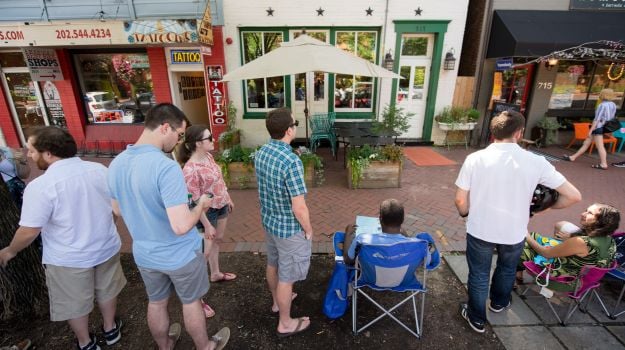
But as it became easier to make reservations with just one click, it also became easier to ditch them.You might think it's no big deal to make a 7 p.m. reservation for next Friday and then change your mind at the last minute, but for some restaurants, it's a major problem. In the restaurant business, time and space - not just food - are money, and every minute a table sits empty is one without anticipated income. If you haven't called to cancel, a restaurant will hold your table for a bit, irritating people on the waitlist. (Ever been told there's a 20-minute wait when you can see several empty tables? That's often why.) And the restaurant has already paid for the food for your meal - not to mention the staff to cook it and wait on you and clean up after you. Restaurants operate on a razor-thin margin, so no-shows can add up to thousands of dollars lost each year. (OpenTable terminates accounts that bail on four reservations in a 12-month period. But you can simply open another account using another email address.)If two people skip their reservation at the 64-seat Alinea in Chicago one night, "we just prepared two 18-course meals since 6 that morning for ghosts," said co-owner Nick Kokonas. No-shows formerly cost the restaurant an average of $260,000 a year. That number dropped dramatically when Alinea switched to a ticketed system in August 2012. In December 2014, Kokonas grew that into Tock, a management system that provides ticketing services to other restaurants for a $695 monthly fee. Its clients - which include the Shaw Bijou and Columbia Room in Washington, plus others in the United States, England and Australia - are, at least so far, mostly multi-course, theatrical restaurants.The system also allows restaurants to introduce demand-based pricing: making, say, 8 p.m. Saturday seatings more expensive. Kokonas resists comparisons to Uber and its surge pricing, though. Tock is not an app, and its pricing goes both ways: A restaurant can also make a 5 p.m. seating on a Tuesday cost less, as an acknowledgement that it's an unpopular time to dine. (Not a new concept: Remember the early-bird special?) There have been concerns about ticket scalping, but that has been rare. Kokonas says Tock has noticed large batches of tickets for super-elite restaurants purchased from the same IP address, and it has voided those orders.Ticketing might be the most prominent example, but it's not the only way entrepreneurs are trying to disrupt the reservations game, which has been fertile ground for app builders in the last two years. There's Resy, an app from former Eater editor Ben Leventhal, which gives users a chance to snag hard-to-get reservations for a price, about $20. There's Reserve, with a custom concierge service and an automatic payment system that, like Uber, eliminates the need to pull out your wallet at the end of the meal. Reserve's partner restaurants can turn on a feature that allows users to volunteer to overpay for their meal - maybe an extra 25 percent - and the table will go to the highest bidder. There's also Table 8, which started in the paid reservations field but is switching to a system in which a yearly fee of $95 gets its members - mostly business travelers - unlimited free last-minute reservations at top restaurants in 11 cities.
If the idea of paying for reservations makes you lose your appetite, you're not alone. Sherri Kimes, professor of operations management at Cornell University's School of Hotel Administration, has been researching customer opinions about the practice, with unequivocal results. "Overall, people thought it was horrible," she said."Looking at it from a pure academic standpoint," Kimes said, such systems "seem very logical," because they acknowledge that diners are buying not just food but a restaurant's space and time. "But just because something is logical doesn't mean that customers like it."One reason diners may be initially turned off is that these new systems disrupt the balance of power between them and a restaurant. In the traditional model - using Open Table or actually calling, the old-fashioned way - it's the diner, who assumes no risk in reserving and can no-show with minimal consequences, who has the upper hand. That leaves the restaurant, which doesn't know if it would have made $70 or $700, in the lurch.When restaurants or third parties sell tickets or reservations, they transfer some of that burden of risk to the consumer. With ticketing, the restaurant knows exactly how much food to purchase and prepare - and it still gets paid if a customer doesn't show up. Studies have found that customers who pay in advance, put down a deposit or are subject to a no-show fee (i.e., the once-controversial practice of holding a diner's credit card number) are more likely to keep their commitment due to "sunk cost" bias.Or, as Columbia Room's Brown puts it, "The only person who is going to be hurt by this system is someone who never intended to show up, but that person is an [expletive]."That's true for fixed-price ticketed restaurants, but it's more complicated with paid reservations. Those systems benefit people who are willing to shell out a premium for flexibility and access. Right now, restaurants that work with those apps reserve a few tables for these high-end customers, which diminishes the table inventory for regular guests. When demand-based pricing comes into the picture, anyone on a budget may be relegated to Tuesday night dates.No-reservations restaurants, despite their claim, aren't any more egalitarian."Do you know who's standing in line? Task Rabbits," said Kokonas, referring to a website that allows people to hire labor for small jobs. "That tells me that there's something fundamentally wrong with the way they're operating. There's a mentality that the velvet rope is a good thing, and it entices people. I don't think that's the case."
After the knee jerk, diners can begin to see some benefits to the new reservation systems."From the consumer perspective, in a way it gives them more power," said Kimes. "Even if they're not a VIP, they can get in."When buying a ticket, you see exactly how many tables are available on a given night, rather than just taking the host's word for it. If your plans change, you can exchange or sell your ticket. Paying for a last-minute reservation gives you flexibility and allows spontaneity (and, if you're a spouse who always forgets an anniversary, could potentially save your marriage). At restaurants with variable-peak pricing, you could get a discount on a fancy dinner if you're willing to eat early on a weeknight.If you still resent the idea of special treatment for people with more money than you, what's the difference between these apps and a person who palms the maitre'd a crisp $100 bill? The apps' founders argue that they're merely formalizing the system and making it accessible to everyone."People want different channels of access, and if you don't give it to them, they're going to move on to different places," said Santosh Jayaram, co-founder of Table 8. "Access is the ultimate currency."We're used to getting instant access through such apps as Uber and Postmates. And we're already used to variable pricing in other areas of hospitality, including hotels and airfare. (Furthering the airline analogy, Pineapple and Pearls allows guests to select their preferred section of the dining room and charges $150 for seats at the bar: That's $100 less than the dining room, but beverages are excluded. The custom-built ticketing system charges half of the price upfront and the second half the morning of the reservation, with a 72-hour window for cancellation.) But most restaurants have been slow to embrace the idea.In this digital climate, they will have to evolve, says Jayaram."Millennials don't pick up the phone, millennials don't call someone," he said. "They want to open the phone [app], click a button and know they're going to get access to the best."Another industry from which restaurants are taking cues: the theater world. "Nobody goes to the theater and sits in the last row and expects to pay the same as a guy in the 10th row center," said Kokonas.Why shouldn't we treat a night at a restaurant the same as a night at the theater? Food and entertainment have long been inextricably linked - Kokonas points to the 1964 opening of the first Benihana - and now, at a time when celebrity chefs and restaurant openings are covered with as much fanfare as movie premieres, some would argue that food has surpassed the arts as our preferred diversion."We're there to wow you," said Brown.
If, like Kimes' study participants, you're not wowed by these new developments, you shouldn't worry. For one thing, restaurants that use Resy, Table 8 and other paid-reservations sites still take traditional reservations, too. As long as you're not angling for a last-minute 8 p.m. Saturday table for six, you'll probably be able to get what you want without having to pay extra. That leaves the restaurants that are limiting their reservations to tickets. There's no way around it, but you're not paying extra; you're just pre-paying for your meal, including the tip.Kimes isn't sure all of these entrepreneurs will be in it for the long haul, anyway; Open Table, which enjoys a vast market share, probably doesn't need to watch its back."I think there's going to be some shakeout in these companies, especially if the economy starts to tank," said Kimes. Paid reservations, she added, are "kind of a luxury," and one likely to take hold only in the biggest cities.For the time being, at least, the reservations game remains a matter of priorities: If getting the right table at the right restaurant at the right time is of the utmost importance, you now have more ways to make it happen. For the rest of us, any old table will do. (This story has not been edited by NDTV staff and is auto-generated from a syndicated feed.)
Advertisement


